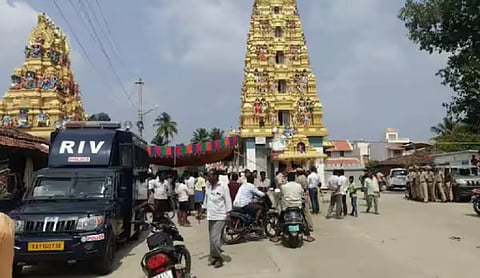
Mandya- A significant controversy has erupted in Karnataka's Mandya district following a historic decision that has challenged centuries-old caste barriers. On Sunday, the district administration granted Dalits their first-ever permission to enter and worship at the Kalabhaireshwara temple in Hanakere village, leading to immediate backlash from upper caste community members who responded by removing the temple's ceremonial deity.
According to many media reports, the temple, which has traditionally barred Dalits from entry, underwent reconstruction about three years ago when its old structure was demolished and rebuilt. The situation took a turning point when the temple recently came under the control of the state government's Religious Endowments Department, opening the door for universal access and challenging long-standing discriminatory practices.
The tension reached its peak when upper caste residents, predominantly from the Vokkaliga community, expressed their strong opposition to the administration's decision by removing the metal 'Utsava Murti' (ceremonial deity) from the temple premises. Witnesses reported hearing protesters declare, "Let them (Dalits) keep the temple, we will take the deity with us," highlighting the deep-rooted resistance to changing traditional caste-based restrictions.
Prior to this dramatic development, Dalit residents had approached the district administration with complaints about discrimination. The authorities attempted to mediate the situation by organizing two peace meetings, but both attempts failed to reach any consensus. Following these unsuccessful negotiations, the administration took a firm stance by facilitating Dalit entry under police protection, marking a historic moment in the village's social fabric.
The situation has necessitated a heavy police presence in Hanakere village to prevent any potential escalation of tensions. The removal of the deity by upper caste members has added another layer of complexity to an already sensitive situation, underscoring the challenges faced in implementing constitutional guarantees of equality in religious spaces.
This incident has brought to the forefront the ongoing struggle for equal religious rights in Karnataka. The transfer of temple management to the state's Religious Endowments Department, while creating an opportunity for reform, has also exposed the deep-seated resistance to changing traditional practices. The authorities' decision to support Dalit entry rights, despite facing significant opposition, represents a crucial step toward social reform in the region.
The current atmosphere in the village remains tense, with authorities maintaining vigilant surveillance to prevent any untoward incidents.
You can also join our WhatsApp group to get premium and selected news of The Mooknayak on WhatsApp. Click here to join the WhatsApp group.